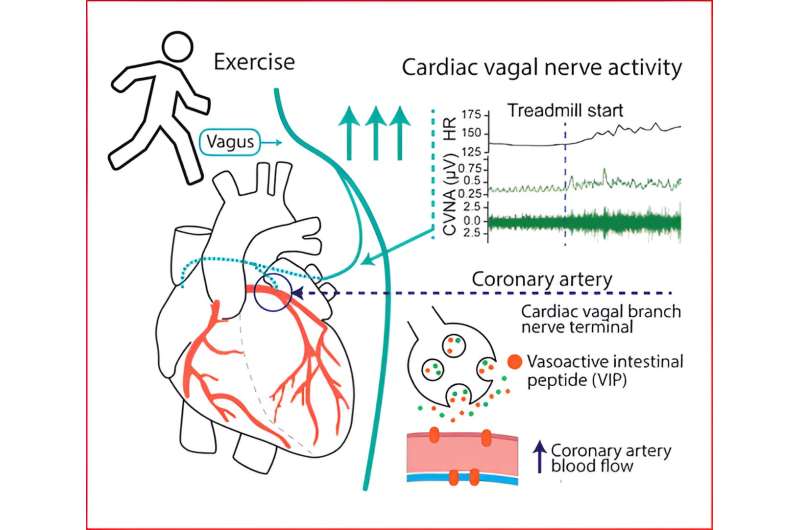This article has been reviewed according to Science X's editorial process and policies. Editors have highlighted the following attributes while ensuring the content's credibility:
fact-checked
peer-reviewed publication
trusted source
proofread
Vagus nerve active during exercise, research finds

The vagus nerve, known for its role in 'resting and digesting,' has now been found to have an important role in exercise, helping the heart pump blood, which delivers oxygen around the body.
Currently, exercise science holds that the 'fight or flight' (sympathetic) nervous system is active during exercise, helping the heart beat harder, and the 'rest and digest' (parasympathetic) nervous system is lowered or inactive.
However, University of Auckland physiology Associate Professor Rohit Ramchandra says that this current understanding is based on indirect estimates and a number of assumptions their new study has proven to be wrong. The work is published in the journal Circulation Research.
"Our study finds the activity in these 'rest and digest' vagal nerves actually increases during exercise," Dr. Ramchandra says.
"Our group has used 'tour de force' electrical recording techniques to directly monitor vagal nerve activity in exercising sheep and has found the activity in these vagal nerves going to the heart increases during exercise.
"For the heart to sustain a high level of pumping, it needs a greater blood flow during exercise to fuel the increased work it is doing: our data indicate that the increase in vagal activity does just this."
During exercise, there is a four to five-fold increase in the amount of blood pumped out by the heart per minute. This requires the heart to beat faster and to contract more forcefully.
The heart's ability to pump blood is modulated by nerves that travel from the brain, called 'autonomic' since they work automatically and do not require conscious thought.
These nerves include the 'fight or flight' or 'sympathetic' nerves and the 'rest and digest' vagal nerves, which are termed 'parasympathetic.'
The vagal nerve connects the brain to the heart, and other internal organs including the gut, regulating the 'rest and digest' parasympathetic nervous system responses.
The new research finds the parasympathetic and sympathetic nervous systems work together in exercise to help the heart pump harder and faster.
The researchers also investigated the role of mediators released by the cardiac vagal nerve.
"The cardiac vagus nerve releases multiple mediators, and previous research has focused on a neurotransmitter, acetylcholine, which has no impact on our ability to exercise," says Dr. Ramchandra.
"Our study focused on a different mediator, vasoactive intestinal peptide (VIP) and it shows that the vagus nerve releases this peptide during exercise, which helps the coronary vessels dilate allowing more blood to pump through the heart."
The first and co-corresponding author Dr. Julia Shanks says, "Vasoactive intestinal peptide was first found in the gut and it does help in digestion, but what we now know is that it is also important in exercise."
The trial was conducted in sheep, because of their similarity to humans in many important respects including cardiac anatomy and physiology. They are also well-established as an animal model to assist with finding ways to combat heart disease that translate to humans.
These fundamental findings could have applications in diseases, including heart failure, where people cannot tolerate exercise.
"This inability to carry out simple tasks involving exertion means that quality of life is severely compromised in these patients," Dr. Ramchandra says.
"One potential reason why exercise tolerance is reduced is that the diseased heart simply does not receive enough blood.
"Our follow-up study will try to see whether we can use this important role of cardiac vagal nerves to improve exercise tolerance in heart failure."
There is a lot of interest in trying to 'hack' or improve vagal tone as a means to reduce anxiety. Investigating this was outside the scope of the current study. Dr. Ramchandra says we do know that the vagus mediates the slowing down of heart rate and if we have high vagal activity, then our hearts should beat slower.
"Whether this is the same as relaxation, I am not sure, but we can say that regular exercise can improve vagal activity and has beneficial effects."
More information: Julia Shanks et al, Cardiac Vagal Nerve Activity Increases During Exercise to Enhance Coronary Blood Flow, Circulation Research (2023). DOI: 10.1161/CIRCRESAHA.123.323017



















